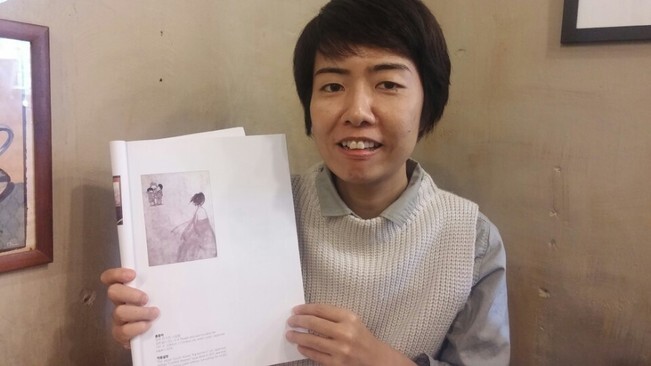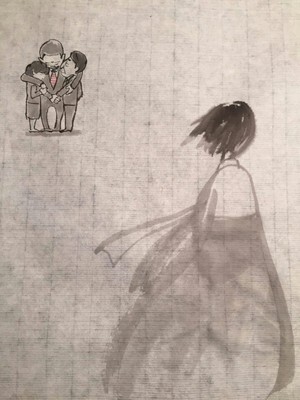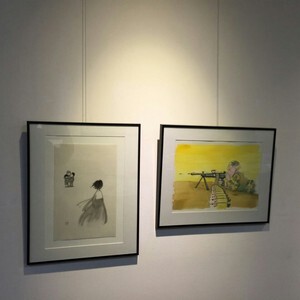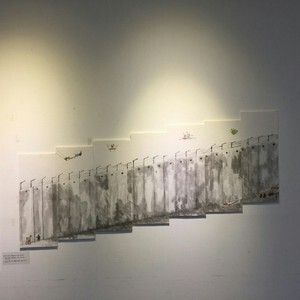hankyoreh
Links to other country sites 다른 나라 사이트 링크
[Interview] Japanese artist inspired by the “energy” around the comfort women issue

South Korean President Park Geun-hye stands with Japanese Prime Minister Shinzo Abe while US President Barack Obama tries to get them to join hands. From behind, a girl can be seen watching them sadly from a distance. Titled "Forgotten People," the painting is on display as part of the 2016 RE: Imagine exhibition – A Satire of the Artists Wish for Peace exhibition taking place through Nov. 20 at the Neutinamu Gallery in Seoul's Tongin neighborhood. The parody of the agreement reached between the South Korean and Japanese governments on the comfort women issue last Dec. 28 is the work of 36-year-old Japanese cartoonist Ayumi Mishima.

The exhibition features over 40 works of cartooning and photography by 13 South Korean artists - including Sangmyung University professor and current events comic artist Ko Gyoung-il and the husband-wife couple Kim Eun-sung and Kim Seo-kyung, who sculpted a statue representing the comfort women that currently stands outside the Japanese embassy in Seoul - and five Japanese artists, including Ako Kawasaki, Masaru Hashimoto, and Hanahana Ichi.
The focus of their attention was on marginalized people and issues such as discrimination against Koreans in Japan, nuclear power, and the US military base on Okinawa. Mishima's interest in the comfort women issue dates back to Dec. 2000, when she saw the Women's International War Crimes Tribunal on Japan's Military Sexual Slavery, a mock trial staged in Tokyo. After seeing the elderly survivors win the case by proving their forcible mobilization and sexual assault had been war crimes and crimes against humanity according to international law, she "felt that these women were claiming justice for themselves within a desolate wilderness." After her career as a comic artist began taking off in 2013, Mishima visited South Korea to lend her voice to the weekly Wednesday comfort women demonstrations in front of the Japanese embassy and efforts to resolve the comfort women issue.

But transferring that issue to the medium of artwork was not easy for her. "Satirical cartoons are at their strongest when they're objective, but as a woman my sympathies were fully with the survivors," Mishima explained. "The suffering they experienced as survivors was too great for me to draw."
Then came the agreement in Dec. 2015, when Seoul and Tokyo declared a "final and irreversible resolution" to the comfort women issue. Many alleged that Washington had been involved in organizing the deal. "I found myself saying bakabakashii- ridiculous," she recalled. "I was so angry that I felt I ought to do something." On Nov. 3, she returned to South Korea at her own expense, carrying five pictures produced from her anger last year.

On Nov. 5, she observed the second National Action candlelight demonstration at Gwanghwamun Square. "The two governments may be trying to erase the comfort
women issue from history, but South Koreans have not changed on it. In putting up the statues, they are looking after the survivors," she said.
"There's an energy. And I think maybe they'll appreciate my work with that same energy."
By Ko Han-sol, staff reporter
Please direct questions or comments to [english@hani.co.kr]
"Forgotten People," a painting by Japanese cartoonist Ayumi Mishima
“Over the Wall,” a painting by Japanese cartoonist Ayumi Mishima
"Forgotten People" (left) and “Self-Defense Forces, Mobilized”, paintings by Japanese comic artist Ayumi Mishima

Editorial・opinion
![[Column] The state is back — but is it in business? [Column] The state is back — but is it in business?](https://flexible.img.hani.co.kr/flexible/normal/500/300/imgdb/original/2024/0506/8217149564092725.jpg) [Column] The state is back — but is it in business?
[Column] The state is back — but is it in business?![[Column] Life on our Trisolaris [Column] Life on our Trisolaris](https://flexible.img.hani.co.kr/flexible/normal/500/300/imgdb/original/2024/0505/4817148682278544.jpg) [Column] Life on our Trisolaris
[Column] Life on our Trisolaris- [Editorial] Penalties for airing allegations against Korea’s first lady endanger free press
- [Editorial] Yoon must halt procurement of SM-3 interceptor missiles
- [Guest essay] Maybe Korea’s rapid population decline is an opportunity, not a crisis
- [Column] Can Yoon steer diplomacy with Russia, China back on track?
- [Column] Season 2 of special prosecutor probe may be coming to Korea soon
- [Column] Park Geun-hye déjà vu in Yoon Suk-yeol
- [Editorial] New weight of N. Korea’s nuclear threats makes dialogue all the more urgent
- [Guest essay] The real reason Korea’s new right wants to dub Rhee a founding father
Most viewed articles
- 1Amid US-China clash, Korea must remember its failures in the 19th century, advises scholar
- 260% of young Koreans see no need to have kids after marriage
- 3[Column] Life on our Trisolaris
- 4[Column] The state is back — but is it in business?
- 5New sex-ed guidelines forbid teaching about homosexuality
- 6How daycares became the most viable business for the self-employed
- 7Presidential office warns of veto in response to opposition passing special counsel probe act
- 8[Reporter’s notebook] In Min’s world, she’s the artist — and NewJeans is her art
- 9Trump asks why US would defend Korea, hints at hiking Seoul’s defense cost burden
- 10OECD upgrades Korea’s growth forecast from 2.2% to 2.6%